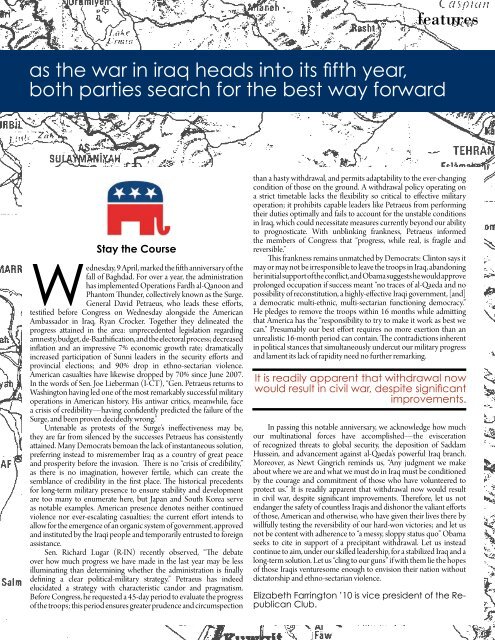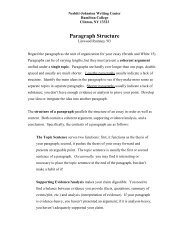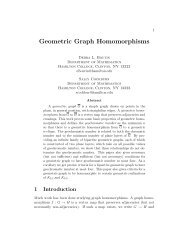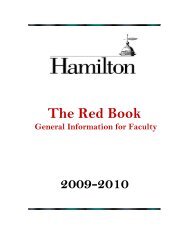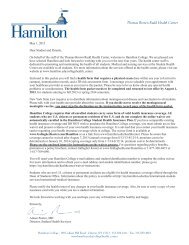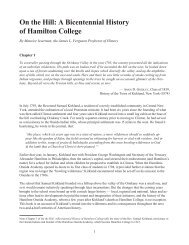The Continental - Hamilton College
The Continental - Hamilton College
The Continental - Hamilton College
Create successful ePaper yourself
Turn your PDF publications into a flip-book with our unique Google optimized e-Paper software.
featuresas the war in iraq heads into its fifth year,both parties search for the best way forwardStay the CourseWednesday, 9 April, marked the fifth anniversary of thefall of Baghdad. For over a year, the administrationhas implemented Operations Fardh al-Qanoon andPhantom Thunder, collectively known as the Surge.General David Petraeus, who leads these efforts,testified before Congress on Wednesday alongside the AmericanAmbassador in Iraq, Ryan Crocker. Together they delineated theprogress attained in the area: unprecedented legislation regardingamnesty, budget, de-Baathification, and the electoral process; decreasedinflation and an impressive 7% economic growth rate; dramaticallyincreased participation of Sunni leaders in the security efforts andprovincial elections; and 90% drop in ethno-sectarian violence.American casualties have likewise dropped by 70% since June 2007.In the words of Sen. Joe Lieberman (I-CT), “Gen. Petraeus returns toWashington having led one of the most remarkably successful militaryoperations in American history. His antiwar critics, meanwhile, facea crisis of credibility—having confidently predicted the failure of theSurge, and been proven decidedly wrong.”Untenable as protests of the Surge’s ineffectiveness may be,they are far from silenced by the successes Petraeus has consistentlyattained. Many Democrats bemoan the lack of instantaneous solution,preferring instead to misremember Iraq as a country of great peaceand prosperity before the invasion. <strong>The</strong>re is no “crisis of credibility,”as there is no imagination, however fertile, which can create thesemblance of credibility in the first place. <strong>The</strong> historical precedentsfor long-term military presence to ensure stability and developmentare too many to enumerate here, but Japan and South Korea serveas notable examples. American presence denotes neither continuedviolence nor ever-escalating casualties; the current effort intends toallow for the emergence of an organic system of government, approvedand instituted by the Iraqi people and temporarily entrusted to foreignassistance.Sen. Richard Lugar (R-IN) recently observed, “<strong>The</strong> debateover how much progress we have made in the last year may be lessilluminating than determining whether the administration is finallydefining a clear political-military strategy.” Petraeus has indeedelucidated a strategy with characteristic candor and pragmatism.Before Congress, he requested a 45-day period to evaluate the progressof the troops; this period ensures greater prudence and circumspectionthan a hasty withdrawal, and permits adaptability to the ever-changingcondition of those on the ground. A withdrawal policy operating ona strict timetable lacks the flexibility so critical to effective militaryoperation; it prohibits capable leaders like Petraeus from performingtheir duties optimally and fails to account for the unstable conditionsin Iraq, which could necessitate measures currently beyond our abilityto prognosticate. With unblinking frankness, Petraeus informedthe members of Congress that “progress, while real, is fragile andreversible.”This frankness remains unmatched by Democrats: Clinton says itmay or may not be irresponsible to leave the troops in Iraq, abandoningher initial support of the conflict, and Obama suggests he would approveprolonged occupation if success meant “no traces of al-Qaeda and nopossibility of reconstitution, a highly-effective Iraqi government, [and]a democratic multi-ethnic, multi-sectarian functioning democracy.”He pledges to remove the troops within 16 months while admittingthat America has the “responsibility to try to make it work as best wecan.” Presumably our best effort requires no more exertion than anunrealistic 16-month period can contain. <strong>The</strong> contradictions inherentin political stances that simultaneously undercut our military progressand lament its lack of rapidity need no further remarking.It is readily apparent that withdrawal nowwould result in civil war, despite significantimprovements.In passing this notable anniversary, we acknowledge how muchour multinational forces have accomplished—the eviscerationof recognized threats to global security, the deposition of SaddamHussein, and advancement against al-Qaeda’s powerful Iraq branch.Moreover, as Newt Gingrich reminds us, “Any judgment we makeabout where we are and what we must do in Iraq must be conditionedby the courage and commitment of those who have volunteered toprotect us.” It is readily apparent that withdrawal now would resultin civil war, despite significant improvements. <strong>The</strong>refore, let us notendanger the safety of countless Iraqis and dishonor the valiant effortsof those, American and otherwise, who have given their lives there bywillfully testing the reversibility of our hard-won victories; and let usnot be content with adherence to “a messy, sloppy status quo” Obamaseeks to cite in support of a precipitant withdrawal. Let us insteadcontinue to aim, under our skilled leadership, for a stabilized Iraq and along-term solution. Let us “cling to our guns” if with them lie the hopesof those Iraqis venturesome enough to envision their nation withoutdictatorship and ethno-sectarian violence.Elizabeth Farrington ’10 is vice president of the RepublicanClub.the continental | spring 2008 33


